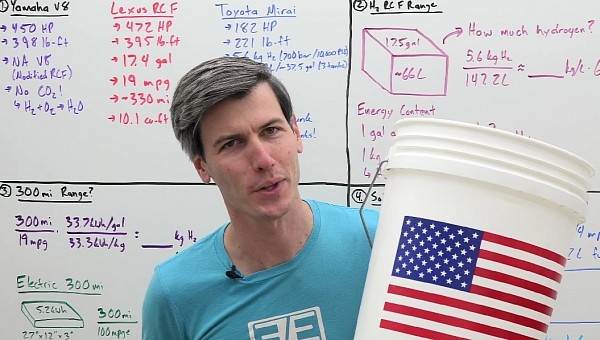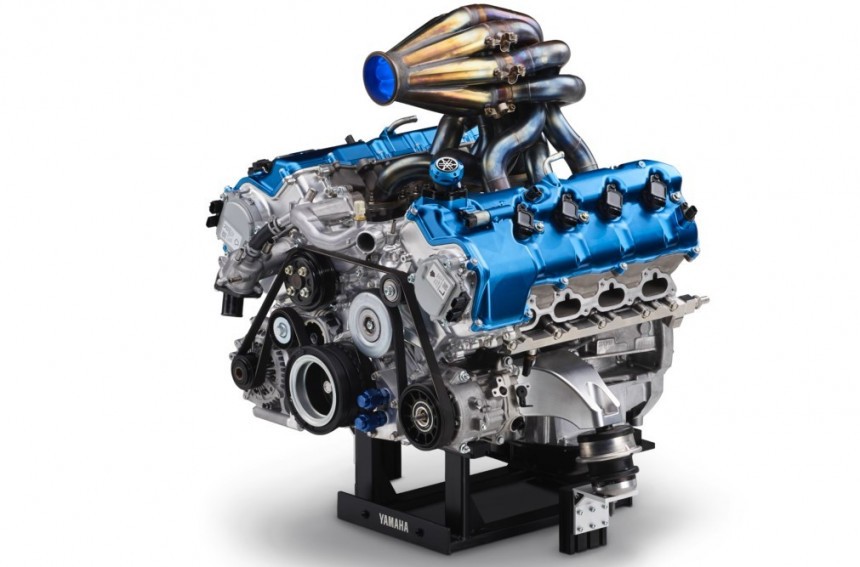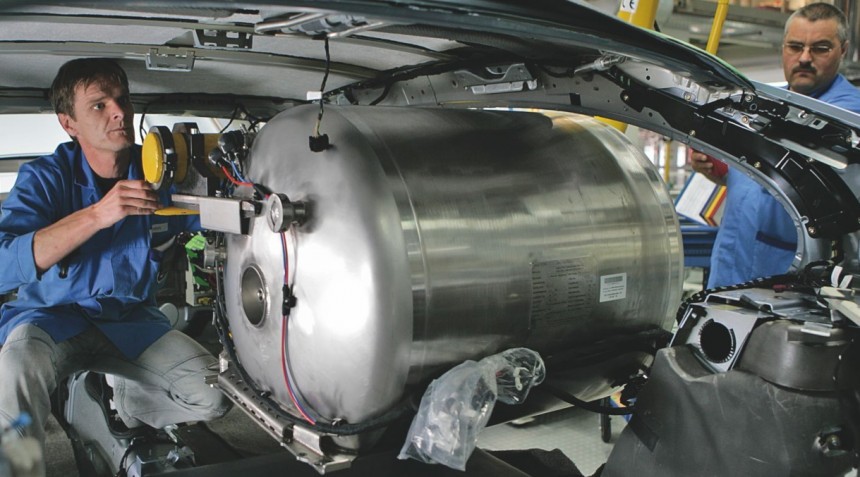Electric vehicles are taking up more and more space in the automotive industry, and for some people, this is disheartening to see happen. It’s hard for car enthusiasts who have grown up hearing and feeling the rumble of a combustion engine to just embrace silent mobility.
But sometimes, there’s light at the end of the tunnel. That light comes in the form of hydrogen combustion. It’s emission-free but manages to keep the sound and feel we’ve all grown so fond of.
Out of all the automakers, Toyota is one manufacturer that is taking this possibility seriously. They already have the Mirai, which is electric and powered by a hydrogen fuel cell. Naturally, the next step was to take that technology further and see if a combustion engine would be viable.
With the help of Yamaha, they have developed a hydrogen-powered V8 based on the engine already found in the Lexus RCF. No wonder then that the two mills are very similar in both horsepower and torque, with a slight lead to the hydrogen version.
But this is where the technology runs into some issues, and Jason Fenske, who runs the YouTube channel Engineering Explained, took the time to explain them. Hydrogen is a bit different from gasoline, as it is a lot more difficult to store. It needs to be kept in pressurized tanks at about 10,000 psi (200 bar). This means that the capacity in relation to dimension is not as good, and the fuel tanks must have a specific shape in order to withstand the immense pressure, further complicating matters.
Now let’s get into the math of fuel consumption since it is innately connected to fuel capacity. One gallon (3.8 kg) of fuel is equivalent to 33.7 kWh of energy, while one kilogram (2.2 pounds) of hydrogen would yield about the same, at 33.3 kWh. This means that mpg would be roughly equal to mpkg (miles per kilogram of hydrogen).
Assuming that a hydrogen-powered sports car had a similarly sized fuel tank to the RCF (which has an EPA fuel rating of 330 miles or 531 km), Jason calculated that a hydrogen version would have a range of just 50 miles (80km). He then used several buckets placed inside a hatchback to illustrate just how much space for fuel tanks would be needed to achieve a similar range, concluding that it would be impractical.
He then took into account the possibility of liquid hydrogen storage to increase the amount of fuel a car could hold. The problem here is the ridiculously low temperature at which it must be kept (-253 degrees Celsius or -423 degrees Fahrenheit).
This has been done in the past by BMW with the Hydrogen 7. However, their attempt only proved this is an even more difficult approach. More specifically, they found out that, after about 17 hours, the temperature inside the fuel tank would begin to increase. This would turn it into a ticking time bomb, as the pressure inside would keep increasing while more and more hydrogen turned from liquid to gas, up to the point of a potential explosion.
To get around this problem, the solution was to release the pressure that would build up. So, if a Hydrogen 7 would just sit around for 17 hours, it would start venting out its own fuel. Let enough time pass by, and it would empty the tank having achieved no range at all.
In the end, even with all the effort put into making hydrogen combustion work, it seems the technology is still not viable for consumers. However, there is still hope there will be alternatives to electric vehicles.
Out of all the automakers, Toyota is one manufacturer that is taking this possibility seriously. They already have the Mirai, which is electric and powered by a hydrogen fuel cell. Naturally, the next step was to take that technology further and see if a combustion engine would be viable.
With the help of Yamaha, they have developed a hydrogen-powered V8 based on the engine already found in the Lexus RCF. No wonder then that the two mills are very similar in both horsepower and torque, with a slight lead to the hydrogen version.
But this is where the technology runs into some issues, and Jason Fenske, who runs the YouTube channel Engineering Explained, took the time to explain them. Hydrogen is a bit different from gasoline, as it is a lot more difficult to store. It needs to be kept in pressurized tanks at about 10,000 psi (200 bar). This means that the capacity in relation to dimension is not as good, and the fuel tanks must have a specific shape in order to withstand the immense pressure, further complicating matters.
Assuming that a hydrogen-powered sports car had a similarly sized fuel tank to the RCF (which has an EPA fuel rating of 330 miles or 531 km), Jason calculated that a hydrogen version would have a range of just 50 miles (80km). He then used several buckets placed inside a hatchback to illustrate just how much space for fuel tanks would be needed to achieve a similar range, concluding that it would be impractical.
He then took into account the possibility of liquid hydrogen storage to increase the amount of fuel a car could hold. The problem here is the ridiculously low temperature at which it must be kept (-253 degrees Celsius or -423 degrees Fahrenheit).
This has been done in the past by BMW with the Hydrogen 7. However, their attempt only proved this is an even more difficult approach. More specifically, they found out that, after about 17 hours, the temperature inside the fuel tank would begin to increase. This would turn it into a ticking time bomb, as the pressure inside would keep increasing while more and more hydrogen turned from liquid to gas, up to the point of a potential explosion.
In the end, even with all the effort put into making hydrogen combustion work, it seems the technology is still not viable for consumers. However, there is still hope there will be alternatives to electric vehicles.



















